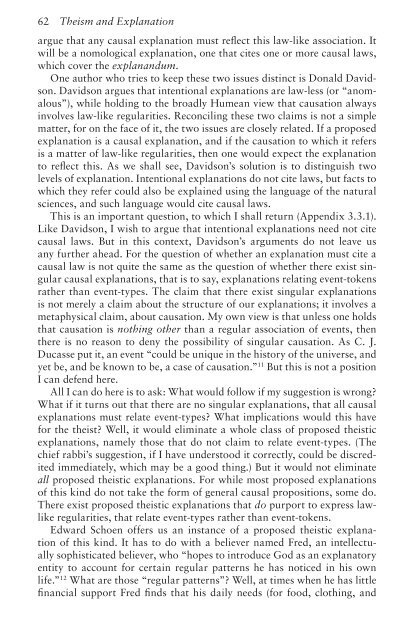Theism and Explanation - Appeared-to-Blogly
Theism and Explanation - Appeared-to-Blogly
Theism and Explanation - Appeared-to-Blogly
Create successful ePaper yourself
Turn your PDF publications into a flip-book with our unique Google optimized e-Paper software.
62 <strong>Theism</strong> <strong>and</strong> <strong>Explanation</strong><br />
argue that any causal explanation must refl ect this law-like association. It<br />
will be a nomological explanation, one that cites one or more causal laws,<br />
which cover the explan<strong>and</strong>um.<br />
One author who tries <strong>to</strong> keep these two issues distinct is Donald Davidson.<br />
Davidson argues that intentional explanations are law-less (or “anomalous”),<br />
while holding <strong>to</strong> the broadly Humean view that causation always<br />
involves law-like regularities. Reconciling these two claims is not a simple<br />
matter, for on the face of it, the two issues are closely related. If a proposed<br />
explanation is a causal explanation, <strong>and</strong> if the causation <strong>to</strong> which it refers<br />
is a matter of law-like regularities, then one would expect the explanation<br />
<strong>to</strong> refl ect this. As we shall see, Davidson’s solution is <strong>to</strong> distinguish two<br />
levels of explanation. Intentional explanations do not cite laws, but facts <strong>to</strong><br />
which they refer could also be explained using the language of the natural<br />
sciences, <strong>and</strong> such language would cite causal laws.<br />
This is an important question, <strong>to</strong> which I shall return (Appendix 3.3.1).<br />
Like Davidson, I wish <strong>to</strong> argue that intentional explanations need not cite<br />
causal laws. But in this context, Davidson’s arguments do not leave us<br />
any further ahead. For the question of whether an explanation must cite a<br />
causal law is not quite the same as the question of whether there exist singular<br />
causal explanations, that is <strong>to</strong> say, explanations relating event-<strong>to</strong>kens<br />
rather than event-types. The claim that there exist singular explanations<br />
is not merely a claim about the structure of our explanations; it involves a<br />
metaphysical claim, about causation. My own view is that unless one holds<br />
that causation is nothing other than a regular association of events, then<br />
there is no reason <strong>to</strong> deny the possibility of singular causation. As C. J.<br />
Ducasse put it, an event “could be unique in the his<strong>to</strong>ry of the universe, <strong>and</strong><br />
yet be, <strong>and</strong> be known <strong>to</strong> be, a case of causation.” 11 But this is not a position<br />
I can defend here.<br />
All I can do here is <strong>to</strong> ask: What would follow if my suggestion is wrong?<br />
What if it turns out that there are no singular explanations, that all causal<br />
explanations must relate event-types? What implications would this have<br />
for the theist? Well, it would eliminate a whole class of proposed theistic<br />
explanations, namely those that do not claim <strong>to</strong> relate event-types. (The<br />
chief rabbi’s suggestion, if I have unders<strong>to</strong>od it correctly, could be discredited<br />
immediately, which may be a good thing.) But it would not eliminate<br />
all proposed theistic explanations. For while most proposed explanations<br />
of this kind do not take the form of general causal propositions, some do.<br />
There exist proposed theistic explanations that do purport <strong>to</strong> express lawlike<br />
regularities, that relate event-types rather than event-<strong>to</strong>kens.<br />
Edward Schoen offers us an instance of a proposed theistic explanation<br />
of this kind. It has <strong>to</strong> do with a believer named Fred, an intellectually<br />
sophisticated believer, who “hopes <strong>to</strong> introduce God as an explana<strong>to</strong>ry<br />
entity <strong>to</strong> account for certain regular patterns he has noticed in his own<br />
life.” 12 What are those “regular patterns”? Well, at times when he has little<br />
fi nancial support Fred fi nds that his daily needs (for food, clothing, <strong>and</strong>



